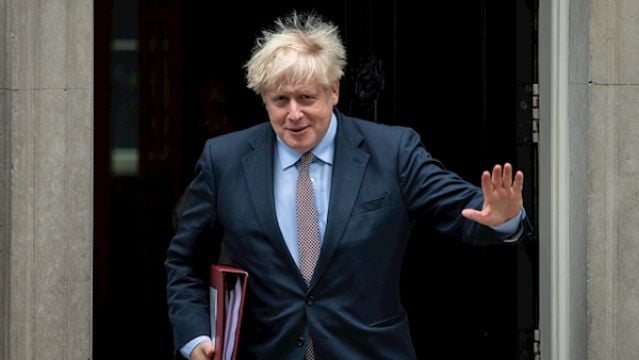The House of Commons will debate the Internal Market Bill, which the EU has demanded Mr Johnson scrap by the end of September in the latest brinkmanship of a four-year saga since Britain voted narrowly to leave the bloc.
After the debate, in a vote that may come late, lawmakers will vote to decide if the Bill should go to the next stage.
The Scottish National Party, backed by the Liberal Democrats, Plaid Cymru and the SDLP want to stop the Bill, saying it breaches international law and the devolution settlement in the UK.
A separate SDLP motion says the Bill should be stopped because it is an outright violation of the Good Friday Agreement.
Mr Johnson's plan to explicitly break international law has plunged Brexit back into crisis less than four months before Britain is finally due to leave the EU's orbit at the end of a transition period.
Ireland and the rest of the EU have ramped up preparations for a no-deal Brexit, which would be chaotic for business, markets and nearly €1 trillion in annual trade.
The British government has dismissed an ultimatum from Brussels to scrap the main parts of the Bill by the end of this month.
Minister for Foreign Affairs Simon Coveney said he still believes the UK's latest approach to Brexit is a negotiating tactic.
"I think that most likely this is a negotiating stategy to try to create a lot of tension, to create some straw men that they can knock over in these negotiations as they draw to a close," he said.
He added: "That I think is the most optimistic reading of this."
Minster for European Affairs Thomas Byrne said the British government should "come back from the brink, re-establish trust and keep your word".
Mr Johnson, who has a majority of 80 in the lower house of parliament, faces a growing revolt from some of his own lawmakers. All of Britain's former prime ministers who are still alive have expressed concern about his plan.
"When the queen’s minister gives his word, on her behalf, it should be axiomatic that he will keep it, even if the consequences are unpalatable," Mr Johnson's former attorney general Geoffrey Cox said in The Times newspaper.
"No British minister should solemnly undertake to observe treaty obligations with his fingers crossed behind his back," said Mr Cox, who was sacked by Mr Johnson in February.
The pound fell 3% last week on fears of a no-deal Brexit, but Goldman Sachs said the odds of such a scenario were in fact lower than the market is implying so current sterling levels could be attractive to some investors.
'Insurance policy'
British ministers say the bill, which explicitly states that it could be inconsistent with a host of international laws, is intended to clarify ambiguities – particularly over Northern Ireland – and act as a safeguard in case trade talks fall.
"Having an insurance policy seems to me sensible," junior interior minister Kit Malthouse said.
But some EU diplomats say they think London is playing a game of chicken, inviting the collapse of trade talks to either get the deal it wants or leave without a deal.
After former prime ministers John Major, Tony Blair, Gordon Brown and Theresa May scolded Johnson for considering breaking the law, another ex-premier David Cameron also weighed in.
"I do have misgivings about what is being proposed," Mr Cameron told reporters.
The EU says it cannot trust those who break agreements and that if the bill is not effectively scrapped there will be no trade deal to cover everything from car parts to food.
Protocol on IE/NI is not a threat to the integrity of the UK. We agreed this delicate compromise with @BorisJohnson & his gov in order to protect peace & stability on island of Ireland. We could not have been clearer about the consequences of #Brexit [1/2]
— Michel Barnier (@MichelBarnier) September 13, 2020
If, as expected, it is passed in its second reading on Monday, there will be four more days of debate on the bill's fine print - lasting into Tuesday of next week.
After the vote on Monday, there will be further votes on attempts to change the wording and meaning of the law, and a final vote to decide whether it goes to the next stage. The most crucial vote is likely to take place next week.
If the Bill then passes the lower house, it will undergo scrutiny in the House of Lords where opposition from Conservative members is expected to be even stronger. – Reuters







